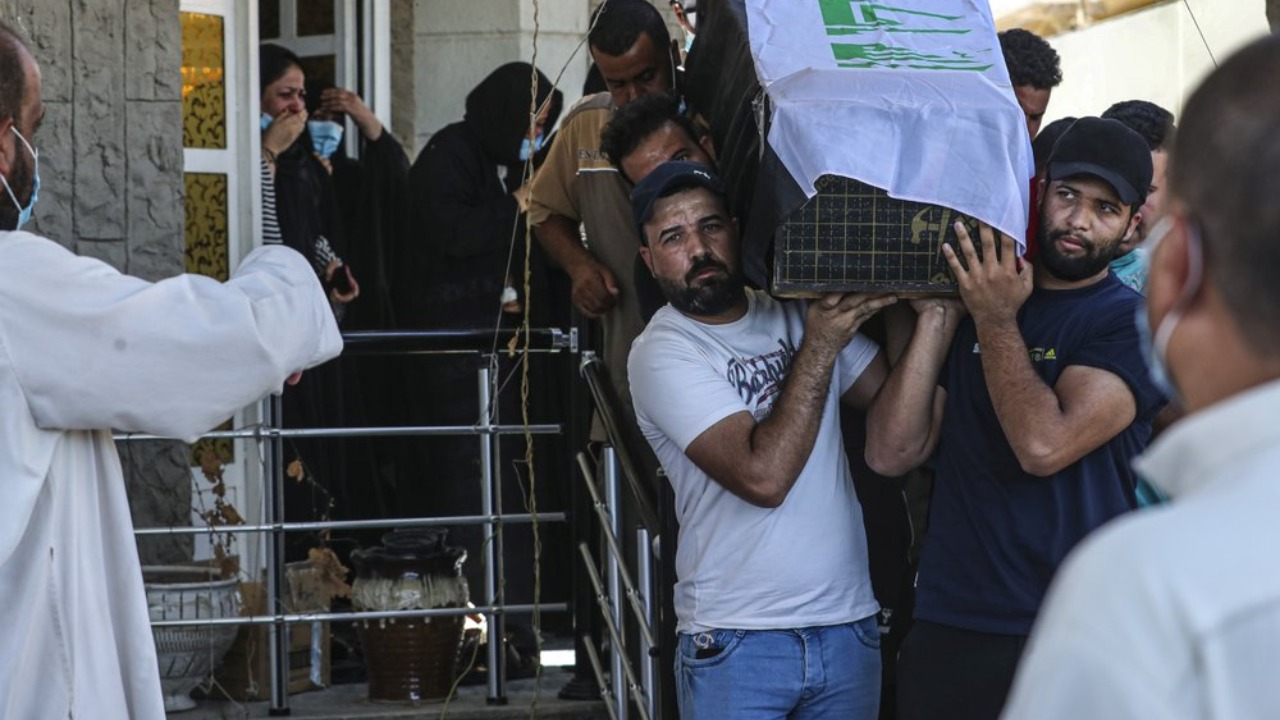Iraqi protests resume as assassinations target activists

ERBIL (Kurdistan 24) – Iraqi protesters took to the streets in the southern city of Basra on Friday, demanding the local government reveal the identities of assailants behind a recent wave of assassinations of political activists as authorities enforced tight security measures to contain them.
Riot control forces deployed and dispersed protesters who set ablaze the Iraqi parliament’s office in the city, local media reported. Several members of the security forces were wounded as at least one protester hurled Molotov cocktails and rocks at them.
The Basra police command called on peaceful demonstrators to work with them to prevent “violent groups” from harming the security forces who are there to “secure and protect demonstrators.”
The incident comes after multiple assassinations of activists in the oil-rich city of Basra.
Activist Tahsin al-Shahmani died last Friday after being shot over 20 times in Basra. His death led to renewed protests that were met with immediate suppression, as local forces forced live rounds on demonstrators, who retaliated with rocks and Molotov cocktails, leading to injuries on both sides.
On Wednesday, Riham Yacoub, 29, a doctor and another prominent activist in the city, was then gunned down by unidentified shooters. She was among vocal protesters that began to partake in marches starting 2018.
After the killings, Iraqi Prime Minister Mustafa al-Kadhimi said he had ordered the firing of the Basra police commander and other officials in the province, though he added, “We will do all that is necessary for the security forces to carry out their duties.”
“Colluding with the killers or submitting to their threats is unacceptable, and we will do whatever is necessary for the Ministry of Interior and security agencies to undertake the task of protecting the security of society from the threats of outlaws.”
Kadhimi came into office in early May, months after his predecessor Adil Abdul Mahdi resigned in the face of growing pressure as a direct result of the protests. He promised to reign in Iran-aligned militia groups acting independently of the federal government and has taken some measures against them, though to little apparent effect.
Since the start of the new movement in October, armed assailants have made at least 15 attempts on activists’ lives, of which eight have been successful, a Financial Times report citing a member of the Iraqi High Commission for Human Rights. Six of the incidents took place so far this month, suggesting that extra-legal efforts to silence and intimidate demonstrators are not decreasing as crowds have gotten smaller in recent months, but intensifying.
According to a recent government report on the demonstrations, about 560 protesters and security forces have been killed. It, however, stopped short of accusing any specific entities or individuals of being behind the violence, drawing criticism from activists who have pointed the finger at powerful Iran-backed militia groups of the Popular Mobilization Forces (PMF).
Basra was the center of the 2018 demonstrations in which crowds demanded improved access to public services and jobs and an end to blatant institutional corruption. A majority of Iraq’s revenue is derived from exports through the province entire, but residents have often complained that none of Basra’s wealth is reinvested in it.
Tehran-aligned militias have gained enormous influence in recent years in the country at large, most notably and dramatically in southern cities like Basra. Protests have repeatedly decried Iranian intervention in Iraq's domestic affairs.
Embassies Condemn Anti-Protester Violence
On Friday, the EU Embassy in Baghdad released a joint statement from the mission offices of 17 countries and the European Union, which said they “wish to express their deep concern at the recent escalation of violence against Iraqi civil society activists.”
“We condemn, in particular, the recent targeted assassinations of activists in Basra and Baghdad amid a systemic campaign of public threats and intimidation,” it added. “We urge all Iraqi leaders to join us in condemning these violent acts, and call on them to take steps to ensure those responsible are punished to the full extent of the law.”
The assassinations come just a month after the killing of Hisham al-Hashimi, an Iraqi government adviser and security analyst who was well-known for his expertise on terrorist groups such as the so-called Islamic State. Fears of broader persecution have since grown among activist communities in Iraq.
The embassies also welcomed “Kadhimi’s pledge to end impunity for such crimes, and reiterate our support to his willingness to reassert the authority of the State, including by bringing armed groups under the control of the State.”
Editing by John J. Catherine
